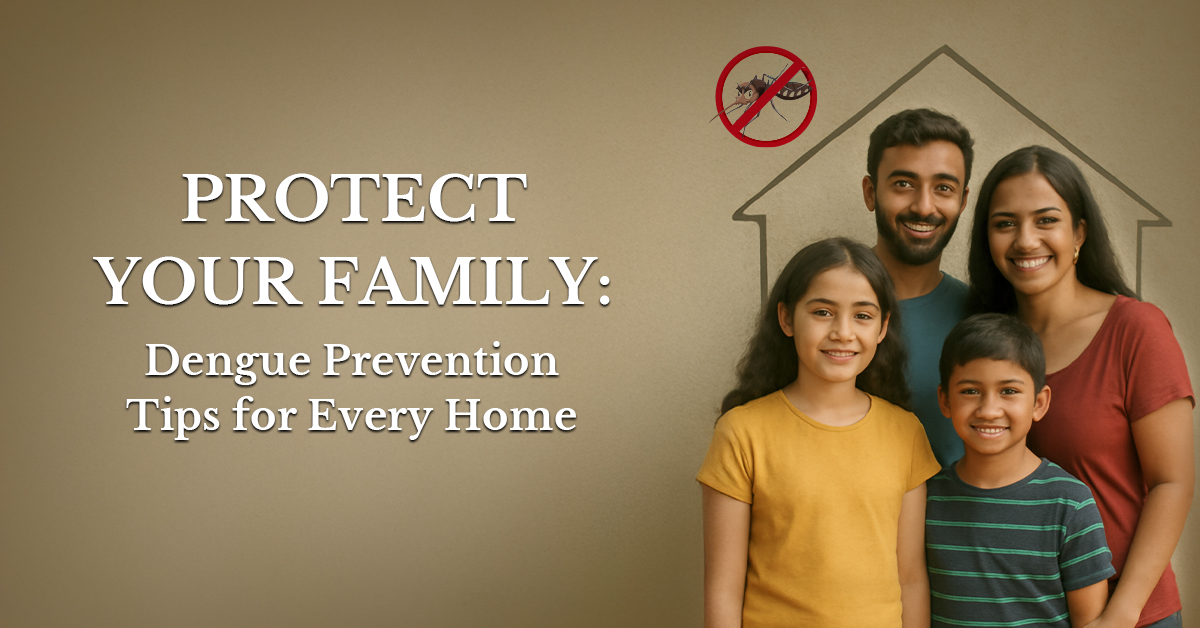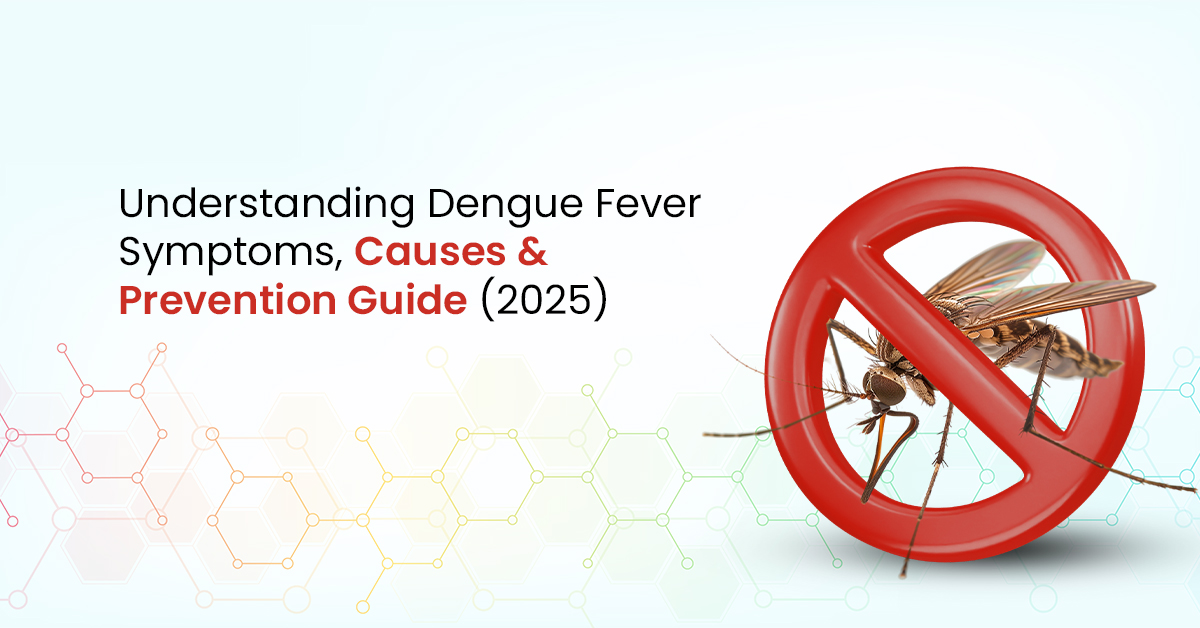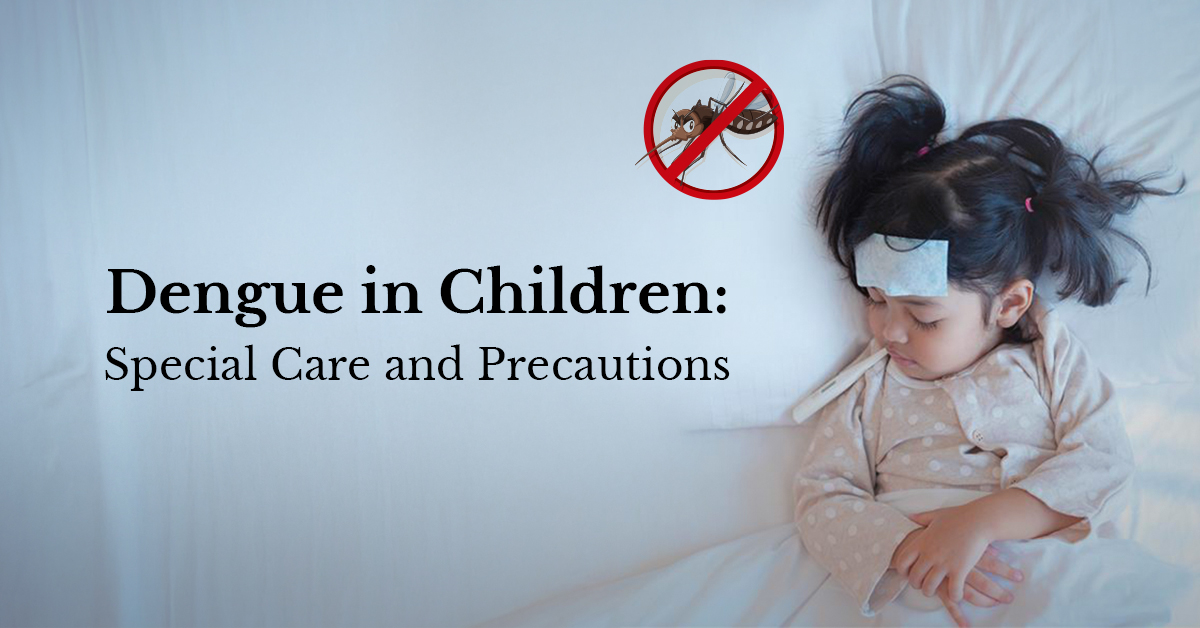Table of Contents

24 Jul, 2025
Protect Your Family: Dengue Prevention Tips for Every Home

Introduction
Dengue fever continues to be a major health concern in many regions, especially during monsoon months when mosquitoes breed rapidly. Since dengue spreads through Aedes mosquitoes, home-level prevention plays a critical role. This optimized guide explains how dengue spreads, what creates breeding sites, and the most effective home-based prevention methods to keep your family safe.
Understanding How Dengue Spreads
Aedes mosquitoes thrive in clean stagnant water. They are highly active during early mornings and late afternoons. A single bite from an infected mosquito can transmit dengue and lead to symptoms like high fever, joint pain, rashes, and in severe cases, Dengue Haemorrhagic Fever (DHF).
Why Stagnant Water Matters
Aedes mosquitoes lay their eggs in containers with clean water such as buckets, pots, tanks, tires, or gutters. Breaking this breeding cycle is the first and most effective prevention method.
Home-Based Dengue Prevention Tips
1. Eliminate Stagnant Water
Check and empty water from:
- Flower pots
- Water tanks
- Buckets
- Pet bowls
- Discarded tires
- Drains and gutters
Cover all water containers with tight lids or mesh screens to stop mosquito access.
2. Use Mosquito Nets and Screens
Install window and door screens to keep mosquitoes out. Even though Aedes mosquitoes bite during the day, using nets around sleeping areas provides added protection.
3. Clean and Disinfect Water Sources
If your home stores water:
- Clean tanks and barrels regularly
- Scrub the inner surfaces
- Use safe larvicides for water sources that cannot be emptied
4. Keep Surroundings Clean
A clean outdoor environment reduces mosquito breeding. Ensure:
- No containers collect rainwater
- Drains are unclogged
- Gardens are maintained
- Plant saucers are kept dry
5. Wear Protective Clothing
When outdoors, wear:
- Long-sleeved shirts
- Long pants
- Light-colored clothing
Mosquitoes prefer dark colors, so lighter shades help reduce attraction.
6. Use Mosquito Repellents
Apply skin-safe repellents with:
- DEET
- Picaridin
- Oil of lemon eucalyptus
For babies, choose child-safe formulas and follow usage instructions carefully.
7. Use Mosquito Traps
Modern mosquito traps using light, heat, or CO2 can reduce mosquito density indoors and outdoors.
8. Mosquito-Repellent Plants
Plants like citronella, lavender, and marigold can help repel mosquitoes naturally, but ensure pots do not hold stagnant water.
Protecting Children from Dengue
Children spend more time outdoors and are more likely to be bitten. Protect them by:
- Applying child-safe repellents
- Dressing them in long-sleeved clothing
- Using nets on cribs and playpens
- Teaching them to avoid standing water areas
Dengue Prevention for the Elderly
Elderly family members are at higher risk of severe dengue. Ensure:
- Protected sleeping areas
- Gentle repellents
- Comfortable long clothing
- Quick medical attention for fever or fatigue
Community Efforts for Dengue Control
Community participation improves overall dengue protection. Encourage:
- Neighborhood clean-up drives
- Reporting clogged drains to authorities
- Participation in local mosquito control programs
- Educating families on prevention
The Role of Caritero in Dengue Recovery
Caritero, a papaya leaf extract, supports the body during dengue recovery by:
- Helping increase platelet counts
- Boosting immune response
- Supporting faster healing with antioxidants
This is a supportive supplement and should be taken along with medical guidance.
Conclusion
Dengue is preventable through simple, consistent actions at home. Eliminating stagnant water, using repellents, wearing protective clothing, installing mosquito screens, and incorporating natural supplements like Caritero can significantly reduce dengue risk. Prevention starts in every household—small steps can protect your entire family
Frequently Asked Questions
1. What is the most effective way to prevent dengue at home?Eliminating stagnant water is the most important step since Aedes mosquitoes breed in clean, still water.
2. How often should I check for mosquito breeding grounds?Inspect your home and surroundings every 2-3 days, especially during monsoon months.
3. Do mosquito nets help prevent dengue?Yes. Nets and screens prevent mosquitoes from entering sleeping and living areas.
4. Are children more at risk of dengue?Yes, because they spend more time outdoors and may not avoid mosquito-prone areas.
5. What type of clothing helps prevent mosquito bites?Light-colored, long-sleeved clothing and long pants offer the best protection.
6. Can papaya leaf extract help during dengue?Papaya leaf extract, like Caritero, may help support platelet count and immunity during recovery.
7. How can I protect elderly people from dengue?Use nets, repellents, proper clothing, and monitor them for symptoms like fever or tiredness.
8. What household items commonly collect stagnant water?Flower pots, plant trays, buckets, tanks, bottles, and clogged drains often collect water where mosquitoes breed.


















